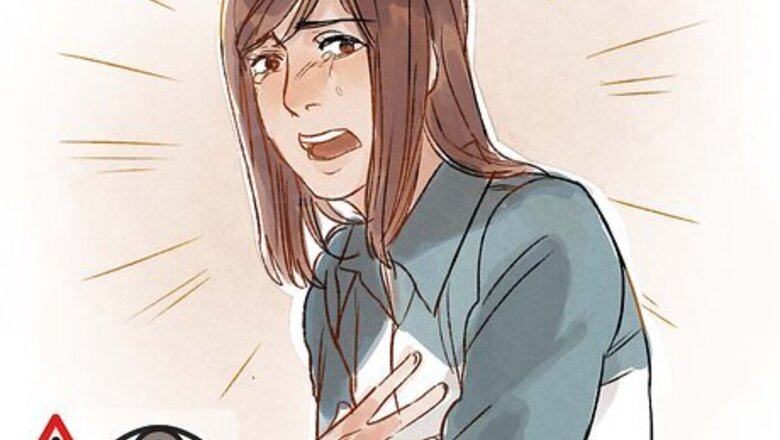
views
Recognizing Symptoms in Your Teen

Look for mood changes. Depression can make your teen’s entire mood and demeanor change. They may start acting extremely sad, angry, or frustrated for no apparent reason. This is different than hormonal or normal mood swings. These are intense feelings that last for a long time. Your teen may be irritable often and get upset easily.

Watch for loss of interest. Depression generally causes a loss of interest in normal activities. Your teen may have once found pleasure in reading, watching television, or sports, but now they don’t. Pay attention to your teen and notice if they find no pleasure in anything anymore. This is different than changing interests. Teens will change as they age, and some things they used to like won’t be nearly as important. With depression, your teen will lose interest in almost all activities.

Look for trouble focusing. Depression can cause your teen to lose focus. This might mean your teen has more trouble concentrating, and therefore their grades may fall. Depression can also cause increased indecisiveness.

Check for fatigue. Depression can cause a person to lose their energy. Feeling listless and fatigued might manifest in many ways. Your teen might start sleeping more than usual, be less active, and go out less. Your teen may even stop hanging out with friends they used to, including their best friends. Your teen’s motivation level may change. Feelings of fatigue may make them feel less motivated than they used to be.

Monitor for feelings of worthlessness or hopelessness. Depression makes people feel like they are worthless or their life is hopeless. These symptoms might be hard to monitor for. Listen to what you teen says. Pay attention to any sentiments that might mean your teen feels worthless or hopeless. Depression can make someone stop enjoying life. Your teen may not see the point of anything anymore.

Notice weight changes. Depression can cause significant weight changes. For some teens, they stop eating and lose weight as a result. Others gain weight because they emotional or stress eat. If you notice your teen has gained or lost weight, it may be due to depression.

Watch for insomnia. Insomnia is a common symptom of depression. Your teen may have trouble falling asleep, sleep less than usual, or be unable to stay asleep. Insomnia may be easy for your teen to hide. If you think your teen looks more tired than usual, check on them throughout the night to see if they are asleep or unable to sleep.

Monitor for suicidal thoughts. People who are depressed don’t always have suicidal thoughts, but it can increase the likelihood of suicidal thoughts. Pay attention to any signs of suicidal tendencies in your teen. The most obvious sign is your teen talking about hurting or killing themself. However, they may not vocalize this around you. Look for unnecessarily dangerous acts, like reckless driving or using drugs and alcohol. Watch for your teen pulling away from their family and friends. Listen for your teen to talk about being hopeless, not talking about the future, or not being around. Look for your teen to give away possessions.

Notice how long the symptoms last. There’s a difference between a teen who’s sad and one who is depressed. Depression lasts for a long time, not just a few days. Symptoms of depression may last for weeks, months, or even longer.

Know common causes of depression. Knowing common causes for depression may help you figure out if your teen has depression. Depression may have no known cause, but there are experiences that may make your teen more susceptible to depression. These include: Death Divorce Having family members who are depressed Having a prior mental health issue Feeling overly stressed Family history of depression
Screening Your Teen

Take your teen to the doctor. If you believe your teen is depressed, take them to the doctor. The doctor can screen your teen and decide if they are actually depressed. You may have to ask your doctor to screen your teen for depression. Make sure to discuss it with your doctor if you are worried about your teen. Some mental health care professionals suggest taking your kid to the doctor once a year from ages 12 to 18. Depression screening is covered under the Affordable Care Act. This means that screening may be free under certain insurance plans.

Take a Mood and Feelings Questionnaire. One screening method the physician may use is the Mood and Feelings Questionnaire (MFQ). It’s a 32-item questionnaire that gauges how your teen has felt over the previous couple of weeks. It only takes around half an hour to complete. Sample questions include whether the teen felt unhappy in the last two weeks, felt restless, felt grumpy, talked less, blamed themself, or hated themself. There are also MFQs for parents to complete. These include questions where you check if the action is true, sometimes true, or not true for your teen. Questions include if the teen felt unhappy, if they felt tired or did nothing, if they cried often, if they acted like they hated themself, and if they felt nobody loved them.

Get a Patient Health Questionnaire. The Patient Health Questionnaire (PHQ-9) is used to screen, diagnose, and determine the severity of the depression. Your teen rates how often they feel certain problems. It is a brief tool that should only take minutes to complete. Examples of questions include if the teen has interest in things, if they feel depressed or hopeless, if they have little energy, if they have trouble sleeping, and if they have suicidal or self-harm thoughts.

Ask your doctor about other screening tests. The MFQ and PHQ-9 are not the only two screening methods available. Those are both found online for free and easily accessible. However, there are other screening tests your doctor may use that are only available through a physician. Two examples of other tools include the Beck Depression Inventory, which is a 21-item tool that takes about 10 minutes to complete. The Children’s Depression Inventory is a 28-item tool used specifically for children and adolescents, with questions that are geared specifically towards children. This takes 15 to 20 minutes to complete.

Determine a plan with your doctor. After your doctor screens your child, he will discuss the results with you and your teen. Depending on the findings, whether it is mild depression or severe depression with suicidal thoughts, your doctor will discuss the next steps with you. Together, you, your teen, and your physician will decide how to monitor the symptoms and what further medical or mental health care is needed. Your doctor can help you find therapy and counseling services for your teen. If the depression is due to another health problem, your doctor will discuss treatment options for that.
Providing Support For Your Teen

Take your teen to therapy. Therapy is a common treatment for depression. Talking to a licensed mental health professional can help your teen learn how to manage their feelings. They can find support from a knowledgeable, neutral source. A therapist can help your teen learn how to change patterns of thought and provide them with tools to deal with their depression.

Discuss antidepressant medications with your teen's doctor. Depending on the severity of the depression, your teen may need medication. Talk to the doctor about whether an antidepressant is right for your teen and ask about the possible risks associated with antidepressant medications. Your doctor may suggest an antidepressant for your teen if the benefits seem to outweigh the risks. Be aware that some antidepressants can cause your teen to become suicidal. Several antidepressants known as selective serotonin reuptake inhibitors (SSRIs) can increase suicidal thoughts in children, teens, and adults under the age of 25. For this reason, these medications carry a black box label (the most severe warning label that the FDA makes). The medications that carry these risks include: fluoxetine (Prozac), sertraline (Zoloft), escitalopram (Lexapro), paroxetine (Paxil), citalopram (Celexa), fluvoxamine (Luvox), and venlafaxine (Effexor). Antidepressants don’t work overnight. They take a month to a month and a half to start working.

Support your teen. If your teen is depressed, one of the best things you can for them is to let them know you are there for them. This means you listen to them without lecturing, giving advice, or trying to convince them why they shouldn’t be depressed. Don’t ask your teen too many questions or attack them. If you are frustrated, do not take it out on them. Listen and let them know you are there to support them.

Provide a healthy home environment. To help your teen, try to make your home a healthy environment for everyone. This includes feeding everyone a healthy diet and making time to spend together over meals. Adjust the family schedule so your teen gets plenty of rest. Try to encourage your teen to exercise and be more active. Do activities with your teen to help keep them active and to get them out of the house.

Monitor your teen’s progress. When your teen is depressed, make sure to keep an eye on them. Monitor their behavior to ensure the depression is not getting worse. This does not mean to stay on your teen’s back, to nag them, or to bully them. Remember to stay supportive and loving towards your teen even while you monitor their depression. Keep up with your teen’s medicine schedule. Provide gentle reminders if they are forgetting to take their medicine. Know what you are going to do if your teen’s depression gets worse. Be prepared with a plan.

Remove all alcohol from the home. Alcohol can be tempting for a depressed teen. Because of this, make sure to get rid of alcohol or keep it locked away so your teen won’t have access to it. Lock up all prescription medicines, too, just in case. Talk to your teen about drugs and alcohol. Explain that drugs and alcohol worsen depression and can make them feel worse.
Watch for suicide. Even if your teen is going to therapy and is on medication, you should monitor them for suicide. If they show any signs, call your doctor immediately. If it is an emergency, take her to the emergency room or contact a suicide hotline, such as the 988 Suicide and Crisis Lifeline if you're in the United States (you can also text this number).



















Comments
0 comment